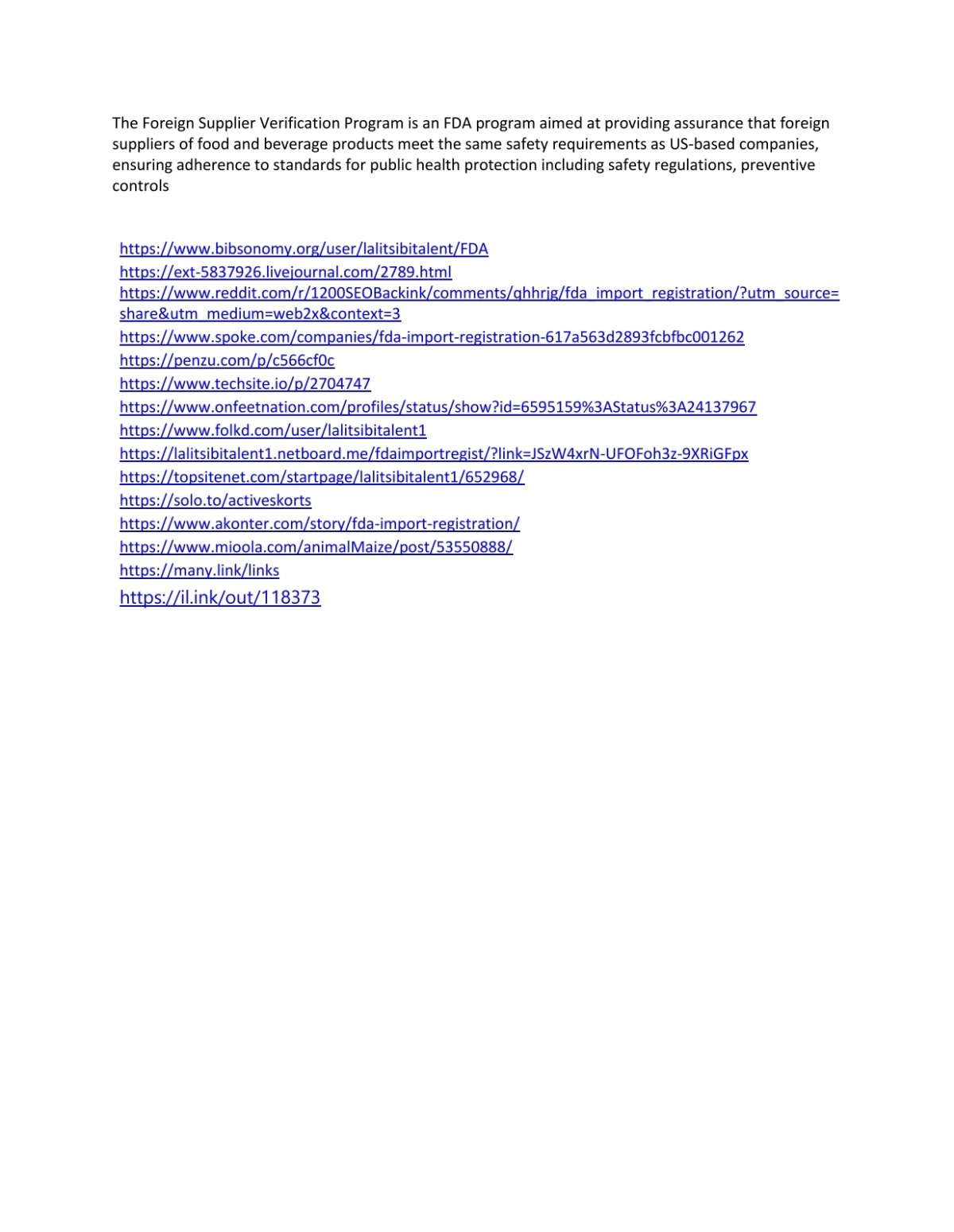Foreign Supplier Verification Program Training

The Foreign Supplier Verification Program (FSVP) is a crucial regulation under the Food Safety Modernization Act (FSMA) that requires importers to ensure that their foreign suppliers are producing food that meets U.S. safety standards. As an importer, it’s essential to understand the requirements of the FSVP and how to implement an effective program to verify the safety of the food you import. In this comprehensive guide, we’ll delve into the world of FSVP training, exploring the key components, benefits, and best practices for complying with this critical regulation.
Understanding the FSVP Regulation
The FSVP regulation, which went into effect in 2017, is designed to prevent contaminated or adulterated food from entering the U.S. market. The regulation applies to importers of human and animal food, with some exceptions. Importers are required to develop and implement a written program that outlines the procedures they will follow to verify the safety of their foreign suppliers. The program must include an analysis of the hazards associated with each food product, evaluation of the supplier’s performance and approval, and regular monitoring and corrective action.
Key Components of FSVP Training
Effective FSVP training is critical for ensuring compliance with the regulation. The training should cover the following key components:
- Hazard Analysis: Importers must identify and evaluate the hazards associated with each food product they import. This includes biological, chemical, and physical hazards that could contaminate the food.
- Supplier Evaluation: Importers must evaluate the performance and safety of their foreign suppliers. This includes reviewing the supplier’s food safety certifications, audit results, and inspection reports.
- Supplier Approval: Importers must approve their foreign suppliers based on the evaluation of their safety and performance.
- Ongoing Monitoring: Importers must regularly monitor their approved suppliers to ensure they continue to meet the FSVP requirements.
- Corrective Action: Importers must take corrective action when a supplier fails to meet the FSVP requirements or when a hazard is identified.
Benefits of FSVP Training
FSVP training offers numerous benefits for importers, including:
- Improved Compliance: FSVP training ensures that importers understand the requirements of the regulation and can implement an effective program to comply with the FSMA.
- Enhanced Food Safety: By verifying the safety of their foreign suppliers, importers can reduce the risk of contaminated or adulterated food entering the U.S. market.
- Increased Efficiency: FSVP training can help importers streamline their supply chain management and reduce the risk of costly recalls or regulatory actions.
- Competitive Advantage: Importers who comply with the FSVP regulation can demonstrate their commitment to food safety and quality, which can be a competitive advantage in the market.
Best Practices for FSVP Training
To get the most out of FSVP training, importers should follow these best practices:
- Develop a Written Program: Importers should develop a written program that outlines their procedures for verifying the safety of their foreign suppliers.
- Provide Regular Training: Importers should provide regular training to their employees on the FSVP regulation and their written program.
- Conduct Regular Audits: Importers should conduct regular audits of their foreign suppliers to ensure they are meeting the FSVP requirements.
- Maintain Accurate Records: Importers should maintain accurate records of their supplier evaluations, approvals, and monitoring activities.
- Stay Up-to-Date with Regulatory Changes: Importers should stay informed about changes to the FSVP regulation and update their program accordingly.
Expert Insights
According to food safety experts, the key to a successful FSVP program is to develop a written program that outlines the procedures for verifying the safety of foreign suppliers. This program should be regularly reviewed and updated to ensure it remains effective in preventing contaminated or adulterated food from entering the U.S. market.
<div class="faq-container">
<div class="faq-item">
<div class="faq-question">
<h3>What is the Foreign Supplier Verification Program (FSVP)?</h3>
<span class="faq-toggle">+</span>
</div>
<div class="faq-answer">
<p>The Foreign Supplier Verification Program (FSVP) is a regulation under the Food Safety Modernization Act (FSMA) that requires importers to verify the safety of their foreign suppliers.</p>
</div>
</div>
<div class="faq-item">
<div class="faq-question">
<h3>Who is subject to the FSVP regulation?</h3>
<span class="faq-toggle">+</span>
</div>
<div class="faq-answer">
<p>The FSVP regulation applies to importers of human and animal food, with some exceptions.</p>
</div>
</div>
<div class="faq-item">
<div class="faq-question">
<h3>What are the key components of an FSVP program?</h3>
<span class="faq-toggle">+</span>
</div>
<div class="faq-answer">
<p>The key components of an FSVP program include hazard analysis, supplier evaluation, supplier approval, ongoing monitoring, and corrective action.</p>
</div>
</div>
</div>
Conclusion
In conclusion, FSVP training is essential for importers who want to ensure compliance with the FSMA and prevent contaminated or adulterated food from entering the U.S. market. By understanding the key components of the FSVP regulation and following best practices for implementation, importers can develop an effective program that verifies the safety of their foreign suppliers. With the right training and program in place, importers can reduce the risk of costly recalls or regulatory actions, improve the efficiency of their supply chain management, and demonstrate their commitment to food safety and quality. As the food industry continues to evolve, it’s crucial for importers to stay up-to-date with changes to the FSVP regulation and to continuously monitor and improve their FSVP program to ensure the safety of the food they import.

